BISHOP AUGOUSTINOS KANDIOTIS
OF FLORINA, GREECE
LANDMARKS OF HIS LIFE
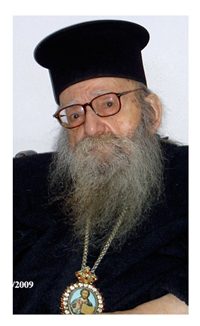 1907 Born in Lefkes, Paros (an island in the Cyclades, Greece).
1907 Born in Lefkes, Paros (an island in the Cyclades, Greece).
1935 Became a monk at the Holy Monastery of Aggelokastro in Akarnania, Greece and his name was changed from Andreas to Augoustinos.
1935 Ordained a deacon in Paravola of Agrinio by the Metropolitan of Akarnania, Hierotheos, and served as a protosinghel.
1941 Transferred to the Metropolis of Ioannina and served as a preacher under Metropolitan Spyridon, who later became archbishop of Athens.
1942 Transferred to the Metropolis of Edessa where he was ordained priest by Metropolitan Pandeleimon.
1942 At the end of the year, was transferred to the Metropolis of Thessaloniki with stints to Kilkis, Veria, Edessa and Florina.
1943-1945 Transferred to Kozani, where he established a food-kitchen and distributed 8000 servings daily. As editor of Estia newspaper, he further established the magazine currently known as Christianiki Spitha (Christian Spark) which was known at different times by the names of: Agapi (Love), Adelphosini (Brotherhood) and To Spiti tou Ftochou (The House of the Poor).
1946-1947 At the request of His Grace Theoklitos, Metropolitan of Grevena, Fr. Augoustinos was transferred there.
1947-1949 At Fr. Augoustinos’ request, he served in the army, holding the rank of Lieutenant. He served in the 15th and 9th divisions and in the second army corps as the director of the office B’10 (Religious Department). He gave sermons every week from the radio station in Larisa. He published the magazine Christianos Stratiotis (Christian Soldier).
1949-1951 Served as a preacher in the Metropolis of Karystia and Skyros.
1950 Published his first book Kosmas Aitolos.
1951 Transferred from the Metropolis of Karystia to the Archdiocese of Athens, and served as preacher under Archbishop Spyridon. He served there for 17 years under 5 different archbishops.
1967 Elected and ordained bishop of Florina, Prespa and Heordaia. During his service as bishop, Fr. Augoustinos:
- – re-established publication of the magazine Salpynx Orthodoxias (The Orthodox Herald).
- – served 5 times on the Holy Synod
- – ordained close to a hundred priests
- – established an ecclesiastical high-school in Florina
- – founded many associations, including the missionary brotherhood Stavros (The Cross).
- – Built tens of churches and institutions (boarding houses, an old-age home, summer camps etc)
- – Set up the radio station St. Chrysostomos
- – Published 85 books and many magazines
- – Wrote 557 encyclicals
- – Delivered sermons throughout Greece
- 1999 Founded the Holy Women’s Monastery of St. Augoustinos in Florina, and consecrated the catholicon of the monastery.
- 1999 December 9, submitted his resignation from duties as bishop, due to old age, having served as Metropolitan of Florina for 321/2 years.
- 2000 January 15, resigned from active service.
After resigning:
- – continued to publish the magazines Christianiki Spitha and Kyriaki (Sunday) – a leaflet and preaching aid for priests.
- – visited parishes in the Metropolis of Florina
- – continued to bless congregations, preach briefly and distribute antidoron.
- – regularly attended the Liturgy at the Holy Women’s Monastery of St. Augoustinos in Florina, blessing the congregation and distributing antidoron.
- – daily received visitors requesting his blessing
- – kept pace with current news events
- – supported the Holy Synod’s decision to have a referendum protesting against the removal of one’s Faith on ID cards.
- – was against the new type of ID cards.
- – In June he paid a visit to his hometown in Paros
- – November 26, was among the priests who were honoured by the Holy Synod for their philanthropic work during the years of the German Occupation.
- 2004 the Metropolis of Florina in co-operation with the University of Thessaloniki published a volume of academic papers dedicated to his honour.
- 2007 Turned 100 years old
- 2009 On January 15, ten years were completed since his resignation as bishop.
- 2010:
- – August 3, suffered a stroke.
- – August 28, reposed.
- – August 30, the funeral service took place at the cathedral of St. Pandeleimon and he was buried at the Holy Women’s Monastery of St. Augoustinos, Florina, in accordance with his request.
HIS ILLNESS
At noon on Tuesday August 3, Bishop Augoustinos suffered a stroke and his personal doctor, G.P. Dr. Elias Stavridis, insisted on his admssion to hospital.
Around 3:00 p.m. he was taken to the hospital in Florina. There, he had a CT in which the stroke was officially detected. Fr. Augoustinos couldn’t move his left hand, he had lost his ability to talk and couldn’t eat. During the following days he had a second scan, X-rays and regular blood tests. Remaining calm, Fr. Augoustinos maintained a reasonably normal temperature at this time. His oxygen levels and blood pressure were good. His heart rate, however, while generally stable, at times showed signs of arrhythmia (irregular heart-beats). Only slight dyspnoea (breathing problem) was noted, which was aggravated temporarily during his compulsory position changes. After the feast of the Dormition of the Virgin Mary, (August 15) his blood pressure started to decline slightly, which towards the end of the month eventually resulted in kidney failure and fluid retention.
Fr. Augoustinos was hospitalized for 26 days, from August 3 until the morning of the 28th. All the medical, nursing, administrative, research and assistant personnel showed avid interest and took great care of him during this time. A special mention must be given to Mrs. Chrysoula Toitou and Mr. Nektarios Vamvakousis; nurses who even when off-duty, willingly came daily for many hours to offer their service with great care and respect. Other doctors and nurses from other hospitals were also found repeatedly at his bedside to offer their knowledge, experience and practical help.
During the hospitalization of the elderly bishop, (in Room 1, Pathological Ward, Eleni Dimitriou Hospital) he received many visitors who took his blessing, (lay-people, clergy and monastics), not only from Florina but also from afar (Mt. Athos, Thrace, Athens, the Peloponnese etc). They were given icons with a stamp of his signature, along with the periodical Christianiki Spitha. It is estimated that thousands of people passed by his bedside. Almost every day, Florina’s current bishop, His Grace Theoklitos, visited Fr. Augoustinos, accompanied by the clergy of his synodia, as did other metropolitans. Most of the clergy who were ordained by Fr. Augoustinos, hastened to kiss the hand which had imparted to them the grace of priesthood. Moving scenes were witnessed. Everyone wanted to express their gratitude and thanks. Many asked for forgiveness, since at some point they had grieved him.
The Mystery of Holy Unction was performed three times in Fr. Augoustinos’ room. Above his head an oil-lamp burned continuously in front of icons of the Lord, the Virgin Mary and various saints. He received Holy Communion on the Sundays of 8th, 15th (after the All-night Vigil) and 22nd August, from the Holy Chalice of St. Augoustinos’ monastery. Many of his spiritual children took turns staying by his bedside, praying and reading spiritual books to him.
HIS REPOSE
Since Fr. Augoustinos had difficulty in eating, on Thursday August 26, the doctors inserted a feeding tube and by evening he had been fed 5 times. The intention –if he regained his strength– was to have a gastroscopic operation to be fed via a feeding gastronomy tube.
From the beginning of his admission to hospital, care was taken to prevent bedsores. This demanded frequent position changes, which however affected Fr. Augoustinos’ breathing. In the meantime, the decline of his blood pressure (from 11/12 to 7/6) resulted in kidney failure. Due to this, it was recommended he not be further burdened with the administration of fluids and the feeding tube was removed. The cessation of urine began to foretell his approaching end.
During the morning of Friday August 27, Fr. Augoustinos’ state of health abruptly deteriorated. However, his countenance remained peaceful, even though his breathing difficulties intensified. Around noon, Holy Unction was performed for the third time, and Fr. Augoustinos received Holy Communion from the artoforion[1] of the hospital’s chapel, St. Luke. Also the Prayer for the Dying was read. Both inside and outside his room, many spiritual children —men, women, clergy and monastics— continuously prayed with a prayer rope and read the Akathist Hymn and Supplicatory Canons, one after another.
During the afternoon, as people continued to arrive uninterruptedly, a priest standing at Fr. Augoustinos’ bedside read the last ten chapters of the Apocalypse (12-22) with which the New Testament is completed, from “Now a great sign appeared in the heaven: a women clothed with the sun” (a passage that was dear to him) until “Surely I am coming quickly.” It also has to be mentioned that during the 26 days of his admittance to hospital, every night, the Holy Monastery of St. Augoustinos had an All-night Vigil.
On August 28 at 5:05 a.m. Fr. Augoustinos’ soul calmly flew to the heavens, “like a bird” as they say in Greek. His face continued to remain calm. The official cause of death was acute pulmonary edema (fluid retention on the lungs).
This date, as many noted, is significant. August 28, according to the new calendar and the Synaxari, commemorates the falling asleep of St. Augoustinos, bishop of Hippo – the saint whose name Fr. Augoustinos was given during his monastic tonsure. (This feast, however, has been transferred to June 15, in order to be co-celebrated with St. Hieronymos.) Also on this day, according to the old calendar on Mt. Athos and other regional Orthodox Churches, the feast of the Dormition of the Virgin Mary is celebrated. Fr. Augoustinos especially loved, honoured and prayed to the Theotokos. Many of his listeners remember how Fr. Augoustinos began his homilies saying a prayer that he himself had composed “All-Holy Lady Theotokos…” Finally, on that same day, 50 years ago in 1959, the venerable Elder Joseph the Hesychast had also reposed. He was Fr. Augoustinos’ fellow villager (born in Lefkes, Paros) and happened to be a student of Fr. Augoustinos’ mother, Sophia Threpsiadou-Kandiotou. Everyone was moved by the significance of the date.
THREE DAY VENERATION
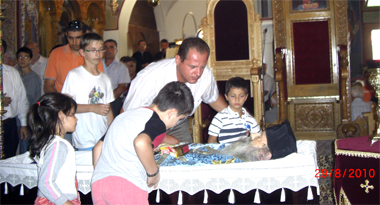 After the medical certification of the death of Fr. Augoustinos on the morning of the Saturday, preparations of the body began (without medical intervention) for the three-day veneration. Even though the temperature was expected to be high, the funeral was scheduled to take place on Monday August 30 at noon, in order for those from afar to have time to arrive and pay their respects.
After the medical certification of the death of Fr. Augoustinos on the morning of the Saturday, preparations of the body began (without medical intervention) for the three-day veneration. Even though the temperature was expected to be high, the funeral was scheduled to take place on Monday August 30 at noon, in order for those from afar to have time to arrive and pay their respects.
The first informed was His Grace Theoklitos, Metropolitan of Florina, who came to pay his respects to Fr. Augoustinos in the hospital room. Bishop Theoklitos immediately initiated the dressing rite, where the pious priests dressed Fr. Augoustinos firstly in his monastic clothes, and then in his bishop’s vestments. Arch-priest Fr. Demosthenis Papadopoulos presided. During the dressing rite, stole-wearing priests read the 11 Matinal Gospels, and the first hierarchical memorial service was performed. The 22nd Psalm “The Lord is my Shepherd,” was chanted while the body was transferred to a simple, uncovered coffin, which was then placed into the hearse. As the small cortège of cars proceeded from the hospital towards the Holy Monastery of St. Augoustinos, the first glimmer of day illuminated the face of the deceased Elder. The coffin was then carried on the clergys’ shoulders and placed in the middle of the monastery’s church, and after reading the Hours, (to give preparation time for the Holy Oblation) the Divine Liturgy commenced. Bishop Theoklitos officiated during the Liturgy and a new small altar-table was used, since an All-night Vigil had taken place in the church the previous evening. At the end of the Liturgy, a memorial service was chanted, and Fr. Augoustinos’ body remained in the church for a while afterwards.
Meanwhile, care of the Metropolis of Florina, the public was informed. The news started to spread, via the churches’ death-knells and through the media, the print and the internet.
At 11:00 a.m. the hearse carrying the body of the venerable Elder, crossed the city to the cathedral of St. Pandeleimon in Florina, and there the public veneration began. During those three days, (Saturday, Sunday and Monday) while countless crowds of the faithful came from near and far, stole-wearing clergy continuously read the four Gospels in front of the open Royal Gate. These readings were only interrupted upon a bishop’s arrival for a memorial service – approx. 30 bishops came and paid their respects.
As the Gospels were read, we instinctively brought to mind the reposed’s preachings on these passages; the great preacher was now silent and resting in the middle of the soleas. When during Saturday Vespers for the feast of the Beheading of St. John the Baptist (August 29) the following doxasticon of the aposticha was heard: “Fore-runner of the Saviour, you rebuked kings that they should not act lawlessly” (Tone 8) it was impossible not to relate the Fore-runner’s censuring style with the bold style of speaking that Elder Augoustinos used to those of high rank.
On Sunday morning a hierarchical Divine Liturgy was performed, led by His Grace Theoklitos and accompanied by many clergy who were ordained by the 104 year-old bishop. As a closing to the Liturgy, an old homily of Fr. Augoustinos’ -coincidentally suitable- was read in front of his coffin, titled: “The Corruption of Morals” (published in the July-August 2010 issue 686 of Christianiki Spitha.) Throughout Sunday, the public veneration continued, along with the reading of the four Gospels.
In the afternoon, amongst other bishops, His Beatitude Hieronymos of Athens arrived from Thrace and performed a brief memorial service, since he had a prior obligation preventing his attendance at the funeral the next day. In the meantime, the crew of the known Orthodox TV station of Thessaloniki, 4E, who had undertaken coverage of these unique events, randomly interviewed a variety of people who had come to pay their respects.
That night, an All-night Vigil was held on a separate altar-table, with His Grace Vasilios, Metropolitan of Elassonas officiating. When the Vigil ended at 2:00 a.m. Bishop Vasilios, assisted by his clergy, (who were conversant with the ritual) performed the lengthy service For Reposed Clergy, which finished after 4:00 a.m.
THE FUNERAL
The day of the funeral dawned. It was Monday, August 30, the feast day of St. Alexander. In the morning, a Liturgy was performed in which His Grace Chrysostomos, Metropolitan of Eleftheroupolis officiated. At the end of the Liturgy, he characterized Bishop Augoustinos as the greatest preacher of the 20th Century. He also proposed the establishment of a Foundation for the research and utilization of Fr. Augoustinos’ writings and sermons.
The Very Reverend Bishop Anthimos of Thessaloniki officiated during the funeral service. At the end, he spoke briefly, emphasizing Fr. Augoustinos’ struggle for the Macedonian issue, evoking hearty applause. His Grace Joel, Metropolitan of Edessa, gave a eulogy from the bishop’s throne, as representative of the Ecumenical Patriarchate of Constantinople. His Grace Sergius, Metropolitan of Grevena, as representative of the Holy Synod of Greece, also gave a eulogy. Archimandrite Hieronymos Nicolopoulos, the secretary of the Holy Synod, was authorized to deliver the funeral oration from the pulpit. Apart from the eulogies delivered by politicians, a eulogy was also delivered by the Heguman (Abbot) of the Holy Monastery of Docheiariou, Archimandrite Gregorios, representing the holy community of Mt. Athos. Finally, on behalf of the clergy from the Metropolis of Florina, the protosinghel Archimandrite Ioustinos Bardakas gave a eulogy. The latter toiled unrelentingly throughout the three days, being responsible for all the funeral proceedings.
The sight of the honourable body, the psalmody, the particular church with its historical pulpit, the eulogies delivered, the throng of faithful lay-people, clergy and monastics, many officials, (church, political, academic, military, judicial etc) together with memoirs of a bishop’s 40-year life and witness that now came to an end – all gave a unique significance to the funeral, and evoked a serene mourning in one’s soul, bringing tears to one’s eyes.
After chanting “Come forth for the Last Farewell” (Tone 2) and when the funeral service ended, the bishop’s body was carried out of the cathedral and placed in the hearse. Archimandrites held the mournful, purple ribbons attached to the hearse, and the funeral procession, directed towards the Holy Monastery of St. Augoustinos, began through the main streets of Florina, under the hot summer sun. The two processional lines included numerous Hegumens, hieromonks and monks wearing their monastic cowls, vested priests and bishops with their staffs. The band struck up mournfully. Feelings of devoutness fanned the hearts of those present.
THE BURIAL
Shortly before the burial destination, the coffin bearing the Elder’s body was taken out of the hearse and carried on the priests’ shoulders to the carefully prepared, verdant gravesite. Enhanced police forces originally banned entry of the crowd to avoid a crush; however after the burial they permitted entrance. Before the coffin’s descent into the grave, His Grace Ignatius, Metropolitan of Arta, performed a short memorial service while His Grace Pandeleimon, Metropolitan of Veria, poured oil from the oil-lamp onto the deceased’s body. According to the church typikon, he threw earth on the body in the form of a cross, citing “For dust you are, and to dust you shall return” (Gen. 3:19). Everyone then chanted “When thou didst descend unto death” (Apolytikion, Tone 2) and “Christ is Risen!”
The deceased Elder’s face was characteristically serene and exuded grace. Throughout the three days, his appearance remained calm and his body retained the usual flexibility of monastics. Without any difficulty, Bishop Theoklitos of Florina took Fr. Augoustinos’ hand and made the sign of the cross over his body. Both during his hospitalization and afterwards, while lying in state, Fr. Augoustinos inspired feelings of devoutness and harmolipi (joyful-sadness) -as opposed to those of tragedy and heart-wrench- to all who had come to bid him farewell. These feelings were particularly evident in the young children who surrounded his coffin without any signs of fear. They venerated Fr. Augoustinos and didn’t want to leave his side.
May his memory be eternal. May his soul find rest in the land of the living, and boldness before the throne of the Lord. May we have his blessing. Amen.
[1] The «Artoforion» contains Holy Communion. This is prepared once annually, on Holy Thursday. The Holy
Communion is deposited in the Artoforion for use in emergencies, when there is no time to celebrate the complete Liturgy.
 Posted by: Επίσκοπος on
Posted by: Επίσκοπος on  Φεβ 4th, 2019 |
Φεβ 4th, 2019 |  Filed under: BIOGRAPHY BISHOP AUGOUST. English, ΑΓΩΝΕΣ, ΒΙΟΓΡΑΦ. π. ΑΥΓΟΥΣΤ.
Filed under: BIOGRAPHY BISHOP AUGOUST. English, ΑΓΩΝΕΣ, ΒΙΟΓΡΑΦ. π. ΑΥΓΟΥΣΤ.
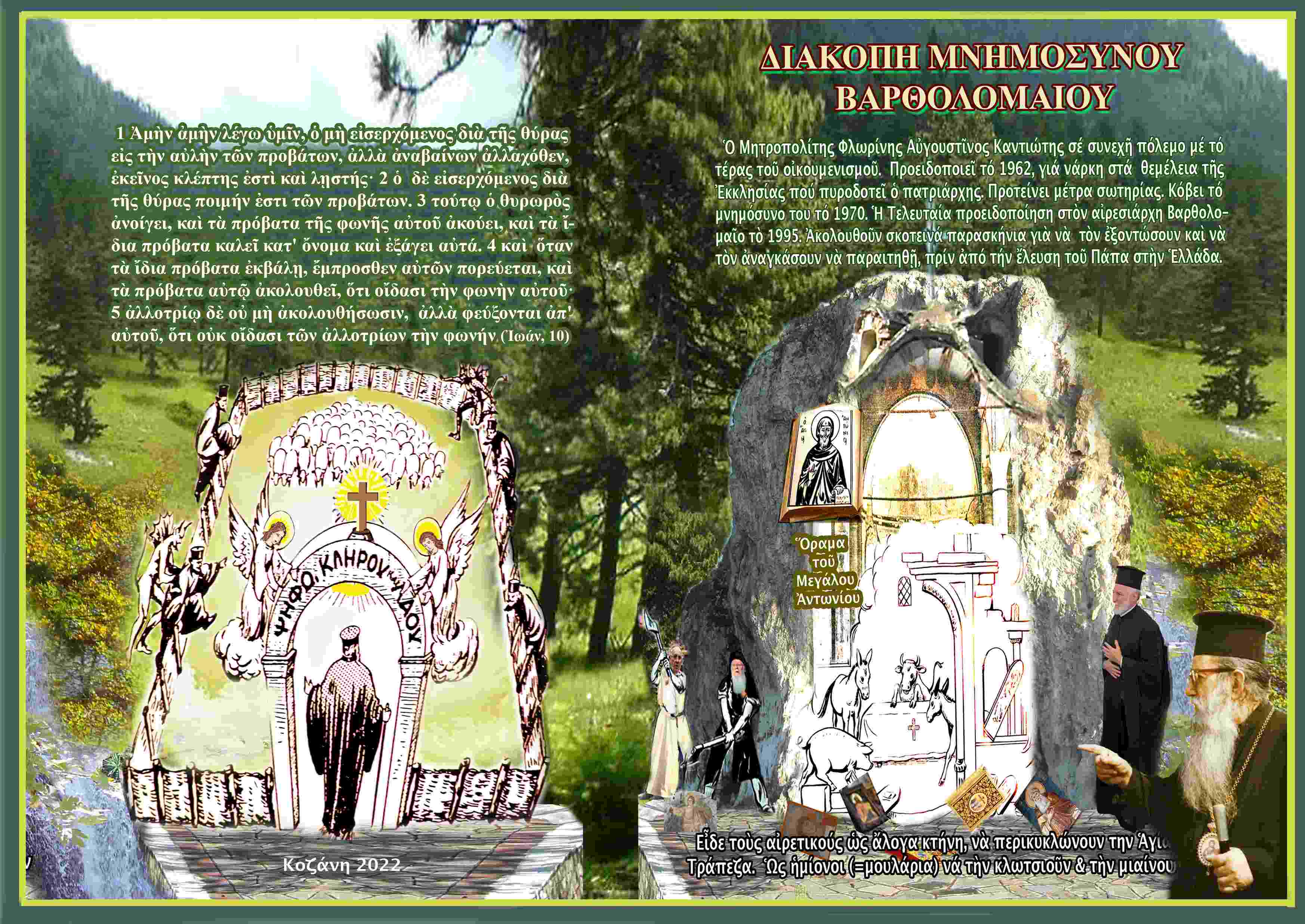

 Be the first!
Be the first! 
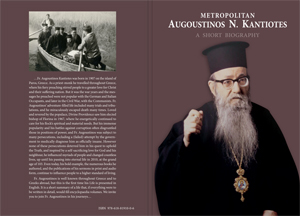
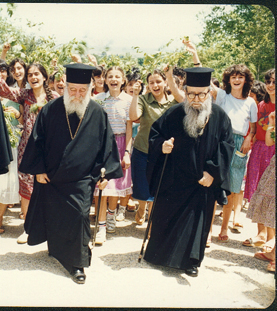




 Rarely would he come out on the streets during his free time with his fellow students. When he was coming out usually he was visiting the courts, or often going to quite places, or to the cemetery, in order to philosophize on the vanity of the world and also to admire art works decorating the graves of the great benefactors. At that time he was reading the newspapers which were describing the astonishing news from the Asian Minor war front. At the same time he was successfully taking care of his father’s business . This is the period when the refuges from Asia Minor were arriving in Paros as well, (like in many other places throughout Greece); these events provoked a great impression on the mind of this young student .
Rarely would he come out on the streets during his free time with his fellow students. When he was coming out usually he was visiting the courts, or often going to quite places, or to the cemetery, in order to philosophize on the vanity of the world and also to admire art works decorating the graves of the great benefactors. At that time he was reading the newspapers which were describing the astonishing news from the Asian Minor war front. At the same time he was successfully taking care of his father’s business . This is the period when the refuges from Asia Minor were arriving in Paros as well, (like in many other places throughout Greece); these events provoked a great impression on the mind of this young student .  Rarely would he come out on the streets during his free time with his fellow students. When he was coming out usually he was visiting the courts, or often going to quite places, or to the cemetery, in order to philosophize on the vanity of the world and also to admire art works decorating the graves of the great benefactors. At that time he was reading the newspapers which were describing the astonishing news from the Asian Minor war front. At the same time he was successfully taking care of his father’s business . This is the period when the refuges from Asia Minor were arriving in Paros as well, (like in many other places throughout Greece); these events provoked a great impression on the mind of this young student .
Rarely would he come out on the streets during his free time with his fellow students. When he was coming out usually he was visiting the courts, or often going to quite places, or to the cemetery, in order to philosophize on the vanity of the world and also to admire art works decorating the graves of the great benefactors. At that time he was reading the newspapers which were describing the astonishing news from the Asian Minor war front. At the same time he was successfully taking care of his father’s business . This is the period when the refuges from Asia Minor were arriving in Paros as well, (like in many other places throughout Greece); these events provoked a great impression on the mind of this young student . 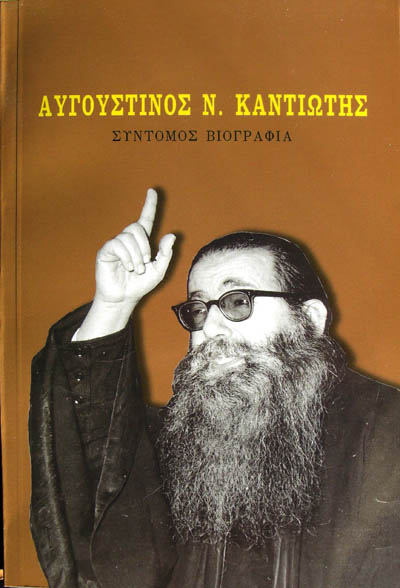 By Archimandrite Laurentios Gratseas
By Archimandrite Laurentios Gratseas